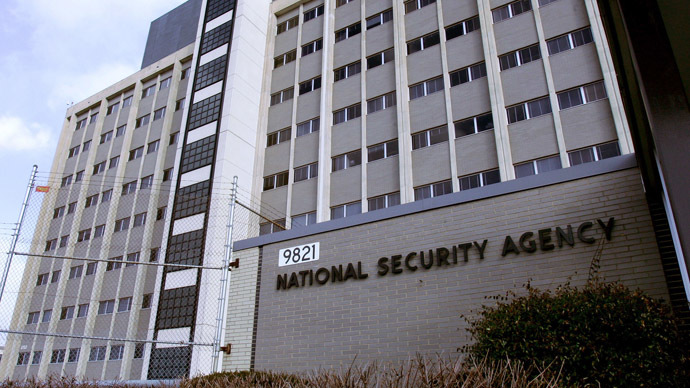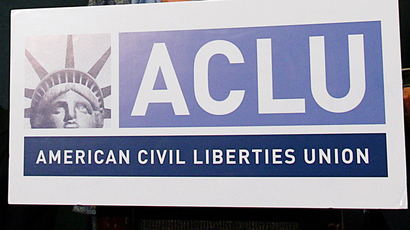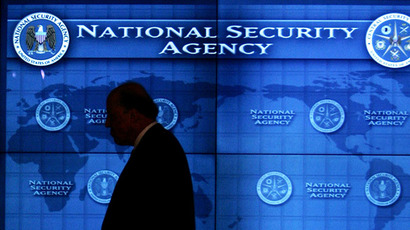NSA's telephone metadata collection not authorized by Patriot Act - appeals court

The collection of telephone metadata by United States intelligence services “exceeds the scope of what Congress has authorized,” a federal appeals court has ruled in a major blow to the National Security Agency.
On Thursday, the US Court of Appeals for the Second Circuit said
the American Civil Liberties Union can sue the director of
national intelligence over the NSA’s bulk collection program,
reversing a ruling handed down more than a year earlier.
A district court judge had previously dismissed a lawsuit filed by the ACLU in June 2013 less than a week
after documents leaked by former NSA contractor Edward Snowden
revealed that the agency has regularly collected records of phone
calls pertaining to millions of Americans. The ACLU appealed that ruling in January 2014 and its
suit has been remanded back to the district court upon this
week’s decision.
Contrary to the government’s earlier arguments, the appeals court
said that the metadata collection program exposed by Snowden
isn’t allowable under Section 215 of the Patriot Act.
“We conclude that the district court erred in ruling that §
215 authorizes the telephone metadata collection program, and
instead hold that the telephone metadata program exceeds the
scope of what Congress has authorized and therefore
violates,” the three-person appeals panel unanimously ruled.
READ MORE: ACLU sues Obama administration over
NSA surveillance
The ACLU first filed the claim after NSA documents published in
the Guardian revealed that Verizon, the US-based telecom, has
been compelled through secret court order to provide the federal
government with call records on a daily basis. Those top-secret
documents provided a previously unseen glimpse at the American
surveillance apparatus and gave way to details about how the
post-9/11 Patriot Act has covertly been used to collect metadata,
including details about the date, length and numbers dialed
pertaining to millions of daily phone calls.
Specifically, Sec. 215 provides for the government to order the
production of “any tangible things” in order to protect against
terrorism. It’s since been interpreted to require telecoms to
hand over all metadata, regardless of who it applies to.
ACLU attorneys claimed their constitutional rights had been violated on account of being a customer of Verizon and therefore subject to the persistent surveillance, but the government insisted that details swept up through the metadata collection program are only queried during certain instances, subject to privacy protections and relevant to national security investigations.
VICTORY! #NSA call tracking program revealed by #Snowden ruled illegal. We filed suit in 2013 https://t.co/CzRyRbJMpZpic.twitter.com/Etptl4gb2A
— ACLU National (@ACLU) May 7, 2015
“Because the NSA’s aggregation of metadata constitutes an
invasion of privacy and an unreasonable search, it is
unconstitutional under the Fourth Amendment,” the ACLU wrote
when the suit was filed within a week of the first Snowden
disclosure. “The call-tracking program also violates the
First Amendment, because it vacuums up sensitive information
about associational and expressive activity.”
The Second Circuit took the ACLU’s claims further this week and
opined that operating the NSA program doesn’t necessarily
constitute an unlawful search of personal data, but rather a
seizure—also prohibited by the Fourth Amendment to the US
Constitution—and a potential violation of the First Amendment.
“When the government collects appellants’ metadata,
appellants’ members’ interests in keeping their associations and
contacts private are implicated, and any potential “chilling
effect” is created at that point. Appellants have therefore
alleged a concrete, fairly traceable and redressable injury
sufficient to confer standing to assert their First Amendment
claims as well,” the court said.
“The more metadata the government collects and analyzes,
furthermore, the greater the capacity for such metadata to reveal
ever more private and previously unascertainable information
about individuals,” the courts acknowledged.
— Andrew Blake (@apblake) May 7, 2015
Furthermore, the appellate judges agreed that the government’s
reliance on supposed “relevance” when citing
intelligence targets is over encompassing, to say the least. The
basic requirements for metadata collection under the provision
“are simply that the records be relevant to an authorized
investigation,” the court acknowledged. However, the
government has argued that all call records are relevant since,
according to the appeals panel, “they may allow the NSA, at
some unknown time in the future, utilizing its ability to sift
through the trove of irrelevant data it has collected up to that
point, to identify information that is relevant.”
“We agree with appellants that such an expansive concept of
‘relevance’ is unprecedented and unwarranted,” the court
said, adding “The statutes to which the government points
have never been interpreted to authorize anything approaching the
breadth of the sweeping surveillance at issue here.”
Anthony Romero, the executive director of the ACLU, said in a
statement after Thursday’s ruling that the impact “will
extend far beyond the mass phone records program.” The
appeal court’s decision, he said, could very well “call into
question the legality of many other government mass surveillance
programs – and truly demonstrate the need for systemic
reform.”
Congrats to the @ACLU for its victory in the Second Circuit—a victory for the liberty and privacy of all Americans. https://t.co/RETJVNShJW
— Justin Amash (@justinamash) May 7, 2015
Indeed, the Second Circuit agreed that the issue may best be left
up to the legislative branch. “The primary role that should
be played by our elected representatives in deciding, explicitly
and after full debate, whether such programs are appropriate and
necessary,” they opined.
Rep. Justin Amash (R-Michigan), an adamant critic of the
surveillance programs, wrote on Twitter that the ruling was
“a victory for the liberty and privacy of all
Americans.” Sen. Rand Paul (R-Kentucky), the 2016 GOP
hopeful, added that he was “pleased” and said “the
phone records of law abiding citizens are none of the NSA’s
business.” Sec. 215 is currently slated to expire in June,
giving Amash and Paul’s colleagues less than a month to decide
what course to take.
“Allowing the program to remain in place for a few weeks
while Congress decides whether and under what conditions it
should continue is a lesser intrusion on appellants’ privacy than
they faced at the time this litigation began,” the Second
Circuit said. “In light of the asserted national security
interests at stake, we deem it prudent to pause to allow an
opportunity for debate in Congress that may (or may not)
profoundly alter the legal landscape.”














